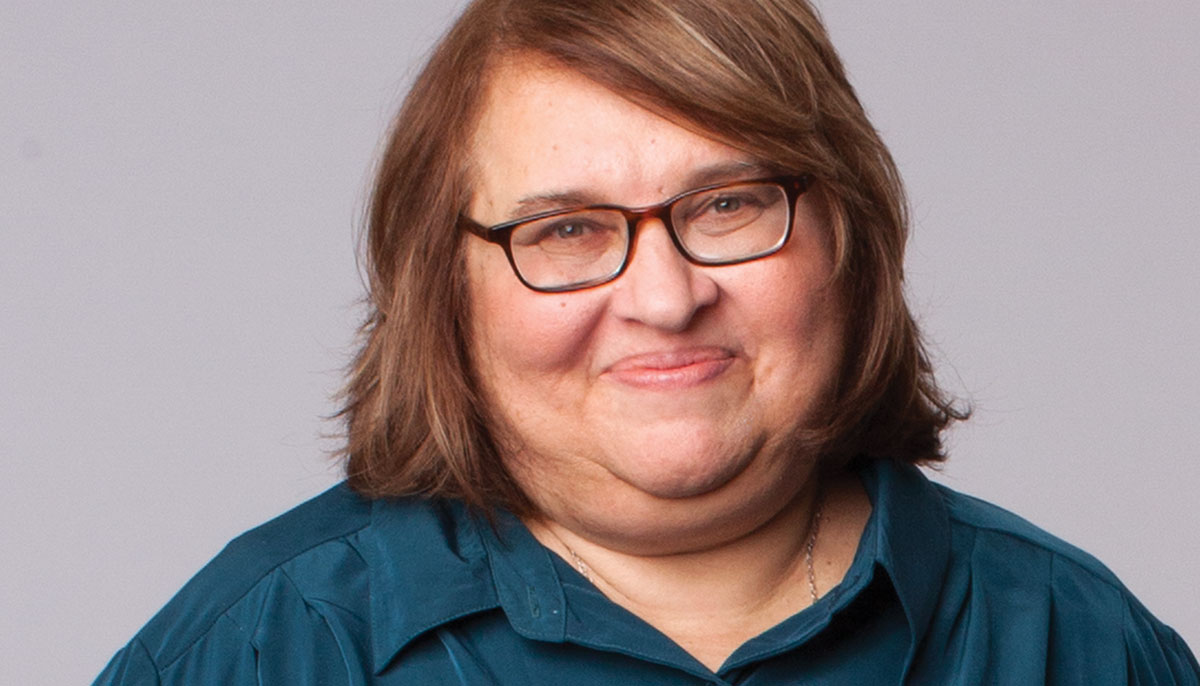Lion’s Roar: What’s your response to people who say that meditation and mindfulness are just ways of checking out and feeling good, no matter what’s going on around us?
Sharon Salzberg: Sometimes, of course, meditation does feel good, because it’s a respite from our normal, anxiety-driven thoughts. But that doesn’t mean those thoughts aren’t happening. It means we’re creating a different relationship to them, so we feel space. We get some rest even as our conditioning is playing out.
What most people don’t understand about meditation is that it’s not about cutting out all thinking, or just sitting there in bliss or peace. It’s about developing a different relationship to whatever is happening. We learn to have a way of experiencing joy, wonder, and delight that we may not have had before because of always being so distracted. We learn to have a different relationship to pain, so we don’t isolate ourselves when we’re experiencing it and we don’t isolate others when they are. And we learn not to endlessly seek stimulation in order to feel alive.
Changing society is a slow process, so if we want to affect any real change, we have to be in it for the long haul. How do we cultivate the patience and persistence we need to do that?
It’s always good to be mindful of one’s expectations. Being older now, I have seen there were times when I thought nothing was being accomplished, only to find out later that we had planted a seed of something good.
It’s like the way we sometimes look at our meditation practice and think, “That was a waste of time!” But then suddenly we’re in a challenging circumstance and we realize, “Oh, meditating really helped me have a steadier mind and be more present for opportunity.” A lot of work in the world can be like that.
There’s an enormous amount of suffering in the world, particularly now. How can we avoid falling into the trap of wanting to look away from it?
Well, sometimes we will. It’s not necessarily a trap unless we stay there. Sometimes we need a break. That is actually true. Sometimes change takes a long time. We’re not going to see immediate results, so we need to allow joy. We need a sense of community, so we don’t feel we’re struggling alone. There’s a lot of joy in community, as we feel supported in a common purpose.
And meditation is a tremendous tool. We can easily get exhausted and feel overwhelmed, but meditation is resilience training. We learn how to begin again and again in our efforts, and we discover inner strengths and a sense of connection to others.
How is it possible to fight hard for what we believe in, but to do it compassionately?
By recognizing human frailty. We realize we all get lost in ignorance. We realize the degree of disconnection that causes one of us to harm another, and that people have views that are very conditioned.
It’s absolutely possible to have compassion for yourself and compassion for others. Wisdom or discernment might tell us that we don’t want a particular person making choices about our lives. We don’t want them on a school board, for example, deciding what texts our children are going to read, or in a legislative body, making decisions about our health care. So we fight, but without that element of enmity.
What’s the best approach when we want to spread a message about a cause that’s important to us?
Convey passion, interest, and commitment. It’s never good to proselytize or cease to listen to other people’s point of view. Also, it’s one thing to have ideals and it’s another thing to take action, even seemingly small action. I found that I care about people voting, so I decided to go out every weekend and help register people.
How should we respond when people are angered by our message, or they’re apathetic or uninterested?
When someone’s angry, that would be an interesting time to hear where they’re coming from and how they’re interpreting what you’re saying. This makes for much better communication. Also, remind people that you’re not trying to talk them into something. You’re trying to reveal your own heart and what you care about, which is irrefutable. You can’t argue with “I care about this,” compared to, “You’re a fool because you didn’t register to vote.”
In terms of apathy or lack of interest, there’s such a pervasive feeling that “The suffering is intractable, so what could my contribution possibly amount to?” People need to be encouraged to do the good that’s in front of them, whether it’s political or not. Even when it’s just helping a friend who’s in trouble, we do the good that’s in front of us, realizing that we’re not in charge of the universe. We can’t solve it all. But we can offer our engagement, and that’s very important.
Do we need to practice compassion for people who cause harm?
What’s essential is not being lost in hatred and fear. For some people, calling that practicing compassion is a bridge too far. I also think it depends on what’s happened and the timing. If you’ve had a devastating personal loss because of someone else’s actions, that’s not the moment to focus on compassion for that person. You are trying to survive. You need to grieve. You maybe need to have compassion for yourself, because many of us feel guilty in those circumstances, like, “I should’ve done this,” or “Why didn’t I do that?” So self-compassion is the task at hand, certainly for a while.
To be lost in hatred is another thing. That’s the kind of preoccupation any of us can get into when we’re obsessed with someone else’s actions. I have a friend who got into one of those things about someone: “They did this,” “They said that,” “They’re so terrible.” After a while, out of compassion for himself, he said, “I let them live rent-free in my brain for too long.”
When we encounter the suffering of the world and experience overwhelming grief or anger, how can we cope with it?
One of the things we say in mindfulness training is “Look for the add-ons.” That terrible feeling is there, but what—out of habit—do you tend to add onto it? Maybe it’s “This is all I’ll ever feel. This is going to last forever,” or “I’m the only one who has ever felt this,” or “I should’ve been able to stop this. This is all my fault,” or “It’s a disgrace that I feel this.” Often we’re adding shame or anger. That’s habit. As we get more mindful, we can see the arising of those add-ons and are able to relinquish them.
Then you’re left with just the emotion, and you take an interest in it. It’s not “Why is that emotion there? What am I going to do about it?” but rather questions like “What does it feel like in my body?” and “What are the changing states of that emotion?”
Underneath anger or feeling overwhelmed there is very often a sense of helplessness, and that’s a horribly uncomfortable thing to feel. But if we can face it and be with it, then we don’t do desperate acts to avoid it and we learn a different relationship to it. It’s like “Okay, this feels really painful. But it’s not wrong. It’s just painful.”
We develop compassion for ourselves and compassion for others, and then we realize, “Oh, if I take one small action, that will help ameliorate that feeling of helplessness.” It won’t dissolve this terrible system of suffering and oppression so many people experience, but it will bring back to life our sense of connection.
Anger can be a powerful fuel giving us the energy to right wrongs. But how can we ensure we don’t burn out from it and that we use anger skillfully?
In Buddhist psychology, anger is a very interesting state. The positive element of it is energy. Anger keeps us from being passive or complacent, and it gives us courage. It’s often the angriest person in the room who’s insisting everybody look at the problem, while everyone else is determined to look the other way.
So, there’s a power to that. But if the anger becomes chronic, we can burn up. The image that’s used in Buddhist psychology is a forest fire, which burns up its own support. Anger can destroy us.
It’s also true that when we’re consumed with anger, we lose perspective. We don’t see options; we don’t find creative solutions. So the first step is what I described before—seeing the anger itself, without the add-ons. Feel it in a more balanced way and watch as it changes. That will create space, and in that space, options arise.
What’s your message for people who feel guilty about having goodness in their own lives when there’s so much suffering in the world?
Look at what’s sustainable for you. People hit a wall by not taking care of themselves. They get overwhelmed and exhausted. They feel a sense of meaninglessness. In psychological terms, there’s vicarious trauma—the traumatic experience we feel from dealing with people who’ve been traumatized.
The people who reach out for a meditative practice are often the people who have either hit the wall or sense it’s right there and they need something to build resilience. Often, it’s hard. They think, “I can’t take the time, there’s so much to do, and I’m not helping anybody else.” But it is like being on an airplane when the flight attendant says, “If the cabin pressure goes down and the oxygen masks descend, put your own on before you try to help anybody else.”
Being connected and caring uplifts us and breaks us out of conventional ideas of where happiness is to be found, like in endless accumulation or stepping on others to get ahead.
What’s your recommendation for a wellness routine for activists?
Meditation is a tremendous tool, including movement meditation, whether it’s walking meditation or yoga or whatever one chooses to do.
But the basic understanding is that we have to have boundaries. Though we need to do what we can do unstintingly, there’s only so much we can do. I really feel if I were in charge of this universe, it would be a lot better. But I’m not. That’s the truth of things, and sometimes you have to take joy in the fact that, although you couldn’t solve somebody’s terrible problem, they didn’t feel so alone for a day, or whatever it is you managed to do. We have to surrender to reality. That will give us strength and buoy us up.
So we just do what we can and then let it go?
Yes. Not in a resigned way, but feeling the fullness of it. Being connected and caring uplifts us and breaks us out of conventional ideas of where happiness is to be found, like in endless accumulation or stepping on others to get ahead. We have lots of myths and lies that we’ve been taught, and we can break free of those through caring actions.
What’s the difference between empathy and compassion?
In the Burmese Buddhist tradition, there’s a twofold definition of empathy and compassion. First there’s the trembling or the quivering of the heart in response to seeing pain or suffering, and then there’s movement toward seeing if we can be of help.
So the first part of that—the trembling or quivering of the heart—is empathy. We resonate. We have a felt sense of what it’s like for this other person or people. It’s not an imposition like, “I know exactly what you’re feeling,” but we have a sense that, “Oh, there was a time in my life when I felt lied to or overlooked or I had such a terrible thing happen to me, so you’re likely in a position like that.” Empathy is very much a felt sense.
Compassion is the part where we move toward seeing if we can be of help. It’s not like moving in to insist we’re going to help or to forget ourselves. “Moving toward” implies balance—compassion for ourselves as well as others, clarity, perspective, and wisdom.
What does this mean for activists?
These days, there’s some emphasis in society on empathy training. That is totally necessary because it can be a cold, cruel world without it. But often people I work with—caregivers, activists, aid workers, people like that—they’ve already got a lot of empathy. That’s why they do what they do. They’re burning out for different reasons. It’s more about balance, having compassion for themselves, and having perspective. Remember, you’re not in charge of this universe.
What are some practices or concepts in Buddhism that might be helpful to non-Buddhist activists?
People who are activists more than practitioners are the very people who say, “I had to deal with the chronic anger that was destroying me,” or “I had to just get out, ride a bike, and look at the sky. I needed a break and I was too guilty to take one, but then I learned I had to.”
Sometimes we hold back because it seems like what we can do is so small it couldn’t make a difference. But it’s essential we do it.
So that’s the notion of balance in Buddhist teachings. Also, there’s equanimity. Not everything is a quick fix. You’ve got to be in it for the long haul, so patience is useful.
Then there’s the Buddhist teaching that we all have innate dignity. When it comes to standing up for their own rights, people have to realize they’re worth something in order to protest their conditions. I think of this woman who’s a leader amongst the striking fast-food workers, fighting for fifteen dollars an hour minimum wage and a union. In that kind of situation where you have very little, often the people in your family say, “Don’t threaten what little you have. Just be quiet.” But something in her said, “No, I work hard, my friends work hard, and we shouldn’t be treated this way, because everybody is worth something.”
What can Buddhists learn from secular activism?
A sense of agency. Instead of simply feeling outrage, writing a nasty tweet, or sitting there discussing a situation, you will feel better if you do something—anything. Do one thing. Sometimes we hold back because it seems like what we can do is so small it couldn’t make a difference. But it’s essential we do it.
One of the things that’s important to me is broadening my definition of social activism. I include art and writing, because things that break down barriers and have us think differently are also about social change. Let’s not limit ourselves to thinking social action means only marching in the streets.
How can we know if our creative expression has a higher purpose?
Look at your motive, which would be a very Buddhist thing to do.


